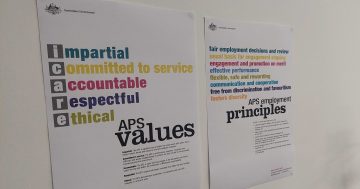
Public servants should not be afraid to point out mistakes to their bosses, new report states. Photo: File.
Running a department on a culture of fear inevitably leads to a lack of trust in public institutions, says the Federal Government’s new report into the integrity of the APS.
Focus on integrity inside the Australian Public Service has intensified with the release of the Integrity Taskforce report, which clearly states the value must be at the very top of the sector’s priorities.
The taskforce was established and a report commissioned in the wake of the Robodebt scandal, advisory and procurement breaches, and other recent incidents that have exposed APS integrity failings.
Published on Friday (17 November), the report Louder than words: An APS integrity action plan, calls for significant changes if the service hopes to win back the confidence of the Australian public.
“The integrity of the public service is one of the key drivers of public trust in government institutions,” the report states.
“Recent lessons in public administration offer us a crucial opportunity for reflection, learning and action on integrity across the Australian Public Service. We should grab it with both hands.
“The APS delivers vital community services and shapes policies that affect the lives of millions of people.
“We need Australians to trust that we will use the power of our role and the resources of the state in the public interest.”
Describing integrity as a broad concept, the report stresses that “at its heart” it is concerned with individual and institutional trustworthiness, and demands high standards of ethical behaviour and respect for the law.
While the “vast majority of Australian public servants” honour this expectation with professionalism and commitment, when failures in public administration do occur, the service needs to be willing to learn from those mistakes.
“Otherwise we risk eroding trust, which can undermine the APS as an effective democratic institution,” the report states.
A strong theme of the report is the need to build a culture where public servants feel comfortable and safe in giving critical feedback to their bosses and to political leaders.
The two main reasons staff do not speak up are the fear of retaliation and the perception that it is futile. But being too scared to speak up will not foster integrity.
The report insists that integrity conversations need to become a part of the everyday conversations and work of public sector teams.
“Where cultures are based on fear and silence, integrity cannot thrive,” the report states.
“If the APS is serious about preventing problems, leaders need to provide the psychological safety necessary for staff to raise issues, ask questions, and point out when lines are crossed without risk of negative consequences.
“This means giving leaders the skills, behaviours and communication tools to build respect and trust.
“Fostering psychological safety also has a range of other important benefits including promoting mental well-being, curiosity and innovation.
“The follow-up and the quality of management’s response to staff concerns is crucial. We need to support leaders to respond effectively, with curiosity, with empathy and without defensiveness.”
APS leaders need to create an environment that empowers staff to perform their roles as impartial advisers in the public interest.
“The relationship of trust with ministers and their advisers is crucial,” the report states.
“Ministers want, and generally appreciate, candid advice that is evidence-based and solutions-focused.
“We have recommended bolstering work to assist ministers’ offices to better understand the different and complementary role played by the public service.
“Equally, our staff need to feel supported by the senior executive in providing frank and fearless advice to the government of the day.”
Recommendations from the report include the need for the APS to appoint the right leaders – people whose behaviour is consistent with the APS Values; and to incentivise good leadership by appraising performance of departmental secretaries and the SES based on delivery of results and leadership behaviours.
Other recommendations include recognising and rewarding people who lead with integrity; focussing on ethical decision making; and Inducting new SES into the cultural stewardship and legal responsibilities of their role.
In total, 15 recommendations have been made across the themes of culture, systems and accountability – all with the aim of implementing strong integrity measures for the service.
In a message to all APS staff, the Secretary of the Department of Prime Minister and Cabinet Glyn Davis and the Australian Public Service Commissioner Gordon de Brouwer said the leadership was: “committed to promoting a pro-integrity culture where all staff feel confident to contribute ideas, provide frank and independent advice and report mistakes.”
Original Article published by Chris Johnson on Riotact.








